|
|
|
Sort Order |
|
|
|
Items / Page
|
|
|
|
|
|
|
| Srl | Item |
| 1 |
ID:
110765
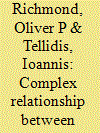

|
|
|
|
|
| Publication |
2012.
|
| Summary/Abstract |
Approaches to terrorism and peacebuilding have a complex relationship with each other, which may be explained according to four categories outlined in this article. These range from blocking each others' aims, nullifying terrorism, supporting a very limited, or a broader peace process. Each of these categories has implications for the inclusion and reconciliation of a wide range of actors and the hybrid nature of the emerging peace. This relates to the critical approach of using theory to create emancipatory forms of peace, which is used as a basis for the examination of the production of hybridity via the interaction of approaches to terrorism and peacebuilding in five cases in this article. These include Sri Lanka, Kashmir, the Middle East, Nepal, and Northern Ireland. We argue that "post-liberal" possibilities for a hybrid form of peace (which are inherent in such conflicts) offer a "post-terrorist" potential for peace processes.
|
|
|
|
|
|
|
|
|
|
|
|
|
|
|
|
| 2 |
ID:
135284
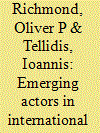

|
|
|
|
|
| Summary/Abstract |
Emerging actors in peacebuilding are generating a slow transformation of the norms and praxes of international peacebuilding, statebuilding, and development. Although each of the emerging donors have different contexts, approaches, motives, and methodologies, their power, influence, and—crucially— their nonadherence to the principles of the Development Assistance Committee of the Organisation for Economic Co-operation and Development have attracted scepticism and criticism from traditional donors. This article highlights the nuances of donors' engagement with peacebuilding and statebuilding. It examines whether they are critical or status quo states and what the implications are for practices of intervention.
|
|
|
|
|
|
|
|
|
|
|
|
|
|
|
|
| 3 |
ID:
143342
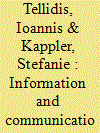

|
|
|
|
|
| Summary/Abstract |
Despite the volume of research exploring the use of information and communication technologies (ICTs) for destructive purposes (terrorism, crime, war propaganda) on the one hand, and development (ICT4D) on the other hand, very little has been said about the role that traditional, and especially new social media, can play for the transformation and prevention of conflicts. This paper recognises ICTs as a tool, thus accepting their multi-level and multi-dimensional potential in the transformation as well as the intransigence and promotion of conflict. The paper seeks to explore: (a) whether ICTs can empower marginalised actors to transcend the peacebuilding and statebuilding processes, and lead to a more locally-owned, more representative transformation of the conflict; (b) whether ICTs can foster more hybrid forms of peace; and (c) whether they can be co-opted as a platform by donors to promote their agendas and impede resistance.
|
|
|
|
|
|
|
|
|
|
|
|
|
|
|
|
| 4 |
ID:
172062
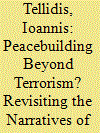

|
|
|
|
|
| Summary/Abstract |
Taking stock of critical peace research and agonistic politics, this article revisits the Basque conflict to examine the role of the state's counterterrorist narrative and that of the Basque civil society in the elimination of violence. It argues that violence could have ended sooner if Spanish governments had sought to engage with the non- and antiviolent independentist discourse of broad sectors of the Basque society, rather than criminalizing it as they rightly did with the radical/extremist nationalists. Had they done so, they could have capitalized on Basque civil society's strong antiviolent and anti–Euskadi Ta Askatasuna discourse to marginalize the terrorist organization and its networks of support. The article presents a framework that makes possible the marginalization of militancy and extremism in cases where the state accepts to negotiate the legitimacy of the demands of non- and/or antiviolent nationalists.
|
|
|
|
|
|
|
|
|
|
|
|
|
|
|
|
| 5 |
ID:
166890
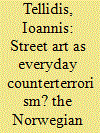

|
|
|
|
|
| Summary/Abstract |
This article looks at a project involving nine internationally acclaimed street artists who agreed to make murals in Oslo, following the 22 July 2011 attacks. Resting on the art project’s aims (‘to promote universal human rights and to counter the intolerance and xenophobia that can give rise to violence and justify terrorism’) and the art community’s reaction, the article argues that street art’s visibility and agency offer alternative ways of thinking about, and approaching, international relations (IR). The article examines the streets as the space where artists express and engage the ‘everyday’; and as the medium that allows artists to bring art to the public (as opposed to galleries or exhibitions the public chooses to visit). We argue that the incorporation of street art’s spatiality and aesthetics into ‘everyday IR’ supports more critical frameworks that (a) expose the exceptional logic(s) of illiberal governance; (b) enable the visibility of marginalised and/or dissenting voices in society; and (c) explore experimental, eclectic and creative approaches of doing/thinking everyday security, community and peace.
|
|
|
|
|
|
|
|
|
|
|
|
|
|
|
|
|
|
|
|
|